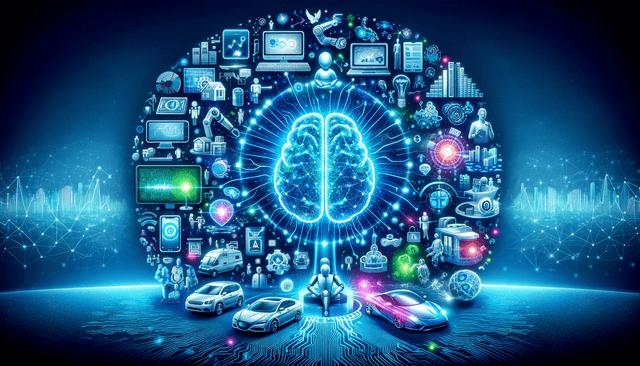Unveiling the Power of Artificial Intelligence as a General Purpose Technology

Imagine a future where every aspect of our lives is enhanced by a single, transformative force. This is not the stuff of science fiction; it’s the reality promised by artificial intelligence as a general purpose technology (AI GPT). With its unparalleled ability to learn, adapt, and optimize, AI is poised to become the backbone of industries worldwide, revolutionizing how we work, live, and interact with the world around us. Dive into the heart of this technological marvel and discover how AI GPT is not just a tool, but a catalyst for innovation and progress.
Table of Contents
Introduction to Artificial Intelligence as a General Purpose Technology
At the dawn of the digital era, a new player has taken center stage in the theatre of innovation: artificial intelligence as a general purpose technology. AI GPT is not just another buzzword; it’s a paradigm shift in how we harness computational power to solve complex problems and enhance human capabilities.- Definition: AI GPT refers to the application of artificial intelligence in a wide range of fields, making it a versatile and transformative force akin to electricity or the internet.
- Potential: Its potential lies in its adaptability, learning from data to improve over time without being confined to a single niche.
- Integration: AI GPT seamlessly integrates into existing technologies, amplifying their capabilities and creating new opportunities for innovation.
The Evolution of AI: From Niche to Necessity
Once a niche field of study, artificial intelligence has burgeoned into a necessity for modern society. Its evolution is a tale of relentless pursuit of efficiency and intelligence, transcending beyond academia into the very fabric of industry.- Early AI: Starting as simple algorithms and logic-based programs, early AI struggled with even basic tasks.
- Machine Learning: The introduction of machine learning marked a turning point, enabling AI to learn from data and improve autonomously.
- AI Today: Today, AI GPT stands as a beacon of versatility, powering everything from search engines to autonomous vehicles.
“Artificial intelligence is the new electricity.” – Andrew Ng, AI PioneerThis transformation from a specialized tool to a general purpose technology didn’t happen overnight. It’s the culmination of decades of research, development, and a relentless drive to push the boundaries of what’s possible.
AI’s Impact Across Industries: A Multifaceted Tool
The versatility of artificial intelligence as a general purpose technology is perhaps most evident in its sweeping impact across various industries. No sector remains untouched by AI’s transformative hand, from healthcare to finance, manufacturing to education.- Healthcare: AI GPT is revolutionizing diagnostics, personalized medicine, and patient care through predictive analytics and robot-assisted surgery.
- Finance: In finance, it’s all about risk assessment, fraud detection, and algorithmic trading, making transactions both safer and more efficient.
- Manufacturing: The manufacturing sector benefits from AI-driven optimization, predictive maintenance, and supply chain management, ensuring seamless production flows.
- Education: AI is personalizing learning experiences, automating administrative tasks, and providing insights into student performance.
Artificial Intelligence in Daily Life: A Ubiquitous Presence
Artificial intelligence has woven itself into the fabric of daily life with a subtlety that belies its profound impact. It’s in the smartphone in your pocket, the car you drive, and even the way you shop. AI GPT has become a ubiquitous presence, often invisible yet indispensable.- Smart Homes: AI powers smart home devices, learning our preferences to manage everything from temperature to security.
- Virtual Assistants: Virtual assistants like Siri and Alexa bring AI into our conversations, helping us navigate our days with ease.
- E-commerce: Online shopping is now smarter, with AI curating personalized recommendations and optimizing logistics.
- Entertainment: Streaming services use AI to analyze viewing habits, crafting bespoke entertainment experiences.
Challenges and Ethical Considerations of AI GPT
With great power comes great responsibility, and the ascent of artificial intelligence as a general purpose technology is no exception. As AI becomes more integrated into society, it raises significant challenges and ethical considerations that must be addressed.- Privacy: The data AI requires to function can infringe on personal privacy if not handled with care.
- Employment: The automation potential of AI raises concerns about job displacement and the future of work.
- Bias: AI systems can inherit biases from their training data, leading to unfair outcomes if not carefully monitored.
- Control: Ensuring AI systems remain under human control and do not act unpredictably is a fundamental challenge.
Preparing for an AI-Powered Future: Education and Policy
As artificial intelligence cements its role as a general purpose technology, preparing for an AI-powered future becomes imperative. This preparation entails a two-pronged approach: education and policy.- Education: Cultivating AI literacy and fostering skills in machine learning and data science is crucial for the workforce of tomorrow.
- Policy: Policymakers must craft regulations that promote innovation while safeguarding against potential abuses of AI technology.
Conclusion: Embracing the AI Revolution
Artificial intelligence as a general purpose technology is not just an incremental improvement but a revolutionary force reshaping our world. Its broad applicability and transformative power make it akin to the steam engine or electricity in its potential to redefine human existence.- AI’s integration into our daily lives and industries is a testament to its versatility and utility.
- Addressing the challenges and ethical concerns it raises is crucial for a future where AI benefits all.
- Education and policy will play pivotal roles in shaping an AI-driven society that is informed, ethical, and forward-looking.
Ai content
This article was generated by Skelet AI
2000+ words in under 10 seconds, costing on average $0.05 per article.*
Ai content
AI-Powered Visuals
Skelet AI HD images effortlessly generated with easy prompts